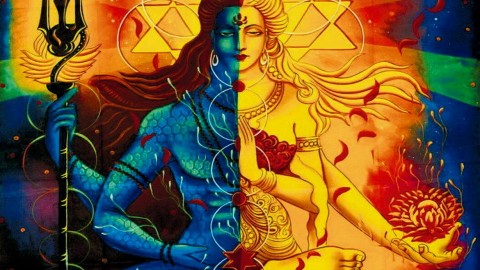Double-Arrowed – In Gita Verse 5.12 The steadily devoted soul attains unadulterated peace because he offers the result of all activities to Me; whereas a person who is not in union with the Divine, who is greedy for the fruits of his labor, becomes entangled.
What Krishna means by – steadily devoted soul attains unadulterated peace because he offers the result of all activities to Me – always remembers himself, he lives in Sumiran. Patanjali calls it Self-Remembering. Self-Remembering does not mean to forget others. It only means without forgetting ourselves.
You don’t remember yourself. You may remember millions of things, but you go on continuously forgetting yourself, that you are. Gurdjieff had a technique. He got it from Patanjali. And, in fact, all techniques come from Patanjali. He is a past Master of techniques. Smriti, remembrance – self-remembering – whatsoever you do. You are walking: remember deep down that ”I am walking, I am.” Don’t be lost in walking. Walking is there – the movement, the activity – and the inner center is there, just aware, watching, witnessing.
You need not repeat it in your mind, “I am walking.” If you repeat, that is not remembrance. You have to be non-verbally aware that “I am walking, I am eating, I am talking, I am listening.” Whatsoever you do, the “I” inside should not be forgotten; it should remain. It is not self-consciousness. It is consciousness of the self. Self-consciousness is ego; consciousness of the self is asmita – purity, just being aware that “I am.”
Ordinarily, your consciousness is arrowed towards the object. You look at me: your whole consciousness is moving towards me like an arrow. But you are arrowed towards me. Self-remembering means you must have a double-arrowed arrow, one side of it showing to me, another side showing to you. A double-arrowed arrow is smriti – self-remembrance.
Very difficult, because it is easy to remember the object and forget yourself. The opposite is also easy – to remember yourself and forget the object. Both are easy; that’s why those who are in the market, in the world, and those who are in the monastery, out of the world, are the same. Both are single-arrowed. In the market they are looking at things, objects. In the monastery they are looking at themselves.
Smriti is neither in the market nor in the monastery. Smriti is a phenomenon of self-remembering, when subject and object both are together in consciousness. That is the most difficult thing in the world. Even if you can attain for a single moment, a split moment, you will have the glimpse of satori immediately. Immediately you have moved out of the body, somewhere else.
Try it. But, remember, if you don’t have trust it will become a tension. These are the problems involved. It will become such a tension you can go mad, because it is a very tense state. That’s why it is difficult to remember both – the object and the subject, the outer and the inner. To remember both is very, very arduous. If there is trust, that trust will bring the tension down because trust is love. It will soothe you; it will be a soothing force around you. Otherwise the tension can become so much, you will not be able to sleep. You will not be able to be at peace at any moment because it will be a constant problem. And you will be continuously just in anxiety.
That’s why we can do one: that’s easy. Go to the monastery, close your eyes, remember yourself, forget the world. But what are you doing? You have simply reversed the whole process, nothing else. No change. Or, forget these monasteries and these temples and these Masters, and be in the world, enjoy the world. That too is easy. The difficult thing is to be conscious of both. And when you are conscious of the both and the energy is simultaneously aware, arrowed in the diametrically opposite dimensions, there is a transcendence. You simply become the third: you become the witness of both. And when the third enters, first you try to see the object and yourself. But if you try to see both, by and by, by and by, you feel something is happening within you – because you are becoming a third: you are between the two, the object and the subject. You are neither the object nor the subject now.
Krishna in this verse says that who has become the third, witnessing consciousness only can surrender me. Means without renouncing anything he remains untouched by everything. This person’s surrender means he merges with me. But who has either remained with others or with himself they cannot surrender and whatever they will be doing their focus is on the fruits and they are entrangel.
Tags: Double-Arrowed





